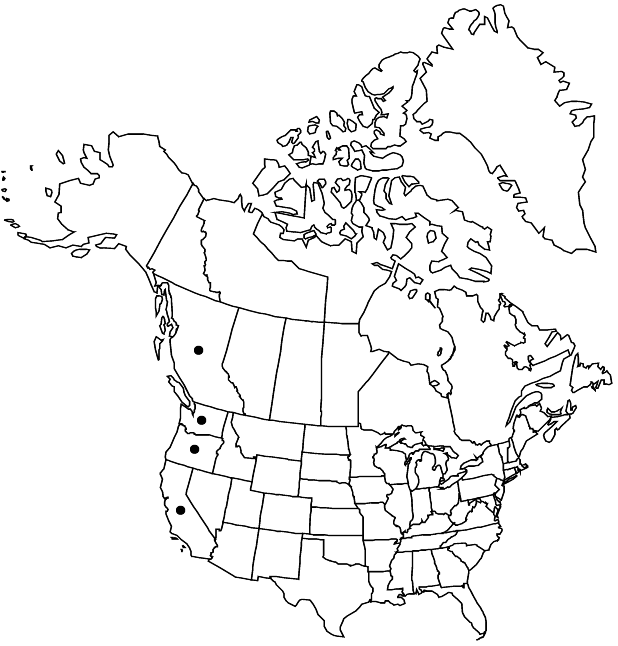Difference between revisions of "Mitella ovalis"
Pittonia 1: 32. 1887 ,.
FNA>Volume Importer |
imported>Volume Importer |
||
| (6 intermediate revisions by 2 users not shown) | |||
| Line 7: | Line 7: | ||
}} | }} | ||
|common_names=Oval-leaf mitrewort | |common_names=Oval-leaf mitrewort | ||
| + | |special_status={{Treatment/ID/Special_status | ||
| + | |code=E | ||
| + | |label=Endemic | ||
| + | }} | ||
|basionyms= | |basionyms= | ||
|synonyms={{Treatment/ID/Synonym | |synonyms={{Treatment/ID/Synonym | ||
|name=Pectiantia ovalis | |name=Pectiantia ovalis | ||
|authority=(Greene) Rydberg | |authority=(Greene) Rydberg | ||
| + | |rank=species | ||
}} | }} | ||
|hierarchy=Saxifragaceae;Mitella;Mitella ovalis | |hierarchy=Saxifragaceae;Mitella;Mitella ovalis | ||
| Line 26: | Line 31: | ||
|elevation=0-1500 m | |elevation=0-1500 m | ||
|distribution=B.C.;Calif.;Oreg.;Wash. | |distribution=B.C.;Calif.;Oreg.;Wash. | ||
| − | |discussion=<p>Mitella ovalis occurs from Vancouver Island and extreme southwest mainland of British Columbia south to Marin County, California.</p> | + | |discussion=<p><i>Mitella ovalis</i> occurs from Vancouver Island and extreme southwest mainland of British Columbia south to Marin County, California.</p> |
|tables= | |tables= | ||
|references= | |references= | ||
| Line 35: | Line 40: | ||
-->{{#Taxon: | -->{{#Taxon: | ||
name=Mitella ovalis | name=Mitella ovalis | ||
| − | |||
|authority=Greene | |authority=Greene | ||
|rank=species | |rank=species | ||
| Line 49: | Line 53: | ||
|publication title=Pittonia | |publication title=Pittonia | ||
|publication year= | |publication year= | ||
| − | |special status= | + | |special status=Endemic |
| − | |source xml=https:// | + | |source xml=https://bitbucket.org/aafc-mbb/fna-data-curation/src/2e0870ddd59836b60bcf96646a41e87ea5a5943a/coarse_grained_fna_xml/V8/V8_221.xml |
|genus=Mitella | |genus=Mitella | ||
|species=Mitella ovalis | |species=Mitella ovalis | ||
Latest revision as of 22:42, 5 November 2020
Plants not stoloniferous or, rarely, stoloniferous. Flowering stems 15–35(–40) cm. Leaves: petiole 1.2–8(–11.3) cm, short stipitate-glandular and densely long stipitate-glandular, longer hairs spreading or retrorse, reddish brown; blade cordate-ovate to cordate-oblong, longer than wide, 2.7–7 × 1.5–5.4 cm, margins shallowly 5-, 7- or 9-lobed, doubly crenate-dentate or dentate, glabrous or irregularly ciliate, apex of terminal lobe acute to obtuse, surfaces sparsely short stipitate-glandular and long stipitate-glandular to sparsely long stipitate-glandular along primary veins abaxially, long stipitate-glandular adaxially; cauline leaves absent. Inflorescences 1–3(–6), closely 20–60-flowered, 1(–2) flowers per node, not secund, 15–35(–40) cm, subglabrous or short stipitate-glandular and sparsely long stipitate-glandular proximally, short stipitate-glandular and, rarely, long stipitate-glandular distally. Pedicels 1–2 mm, short stipitate-glandular. Flowers: hypanthium shallowly saucer-shaped, 0.8–1 × 2–3.5 mm; sepals spreading to recurved, greenish, triangular, 0.7–1 × 0.9–1.9 mm; petals greenish yellow, 3–9-lobed, 1.5–2 mm, lobes linear, lateral lobes spreading; stamens 5, opposite sepals; filaments white, 0.1–0.3 mm; anthers 0.1–0.2 × 0.2–0.4 mm; ovary nearly completely inferior; styles divergent, flattened, 0.2–0.3 mm; stigmas 2-lobed. Seeds reddish purple or blackish, 0.8–1.1 mm, pitted. 2n = 14.
Phenology: Flowering Mar–Jul.
Habitat: Moist woods, stream margins, wet banks
Elevation: 0-1500 m
Distribution

B.C., Calif., Oreg., Wash.
Discussion
Mitella ovalis occurs from Vancouver Island and extreme southwest mainland of British Columbia south to Marin County, California.
Selected References
None.